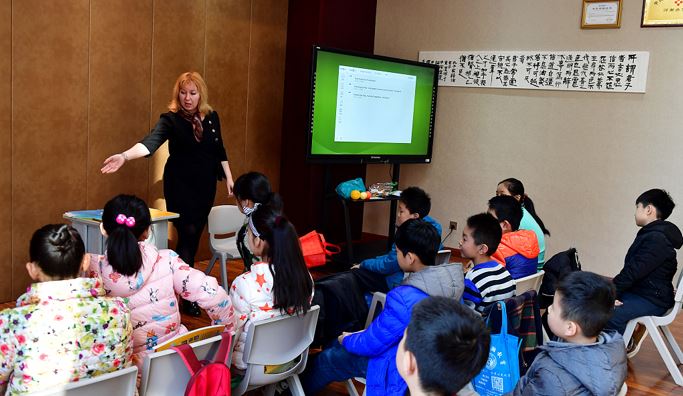
From the People's Daily app.
And this is Story in the Story.
Out-of-school learning is in big demand in China these days because more and more parents want to give kindergarten kids an early start in development.
With the teaching of advanced content banned at kindergartens, parents who are anxious about limited opportunities to enroll their children in preferred schools are eager for additional classes.
An elite public kindergarten in Shanghai's Xuhui district limited the times at which children can be picked up and taken to other educational institutions to further their learning before they attend primary school.
It said the only times they could be picked up by parents and guardians were after lunch or at a set hour in the afternoon to "avoid disturbing order".
Nearly 30 children, mainly in the final grade, are picked up after lunch every day from Monday to Thursday, and on Friday the number almost doubles, according to a security guard at the kindergarten, which has about 100 children in each grade.
"They are taken to classes at educational institutions. 'Interviews' for places at private primary schools will be held in May, and so the number of children being picked up this semester is obviously more than last," said the guard.
Today's Story in the Story looks at why parents put their kids in extra classes at such a young age when the Ministry of Education does not encourage it.

An out-of school English-language class is held in Zhengzhou, Henan province, Nov 25, 2017. (Photo: VCG)
Since 2010, the Ministry of Education has issued at least six notices, banning the advance teaching of any content from primary schools at kindergartens.
But such action, aimed at easing the academic burden on children, failed to relieve parental anxiety. It only made after-school classes at training institutions more popular, not only on weekends, but also on weekdays.
A report released by the Customer Evaluation Center affiliated to the Shanghai Association for Quality in 2017 showed that nearly three in four Shanghai children aged 4 to 6 were taking classes at institutions.
In Shanghai, all children have access to public primary and junior high school education without taking an exam, but private schools, which are generally believed to have better teachers and students, enroll pupils through "interviews".
Zhou Liyan, who takes her daughter, a final-grade kindergarten pupil, out of school after lunch twice a week for extra classes, said most parents do not want to force their children into additional lessons, but are compelled to do so as opportunities to get them enrolled in good schools are limited.
Looking ahead, she said the policy for the gaokao, the national college entrance exam, influences parents to turn to additional education institutions.
"At kindergarten, children spend most of the time sleeping, having snacks and doing sports in the afternoon. But we've no choice but to spend time preparing for the 'interview'," Zhou said, adding that the children who do not drop classes in the afternoon still do additional work after supper when their parents are home from work.
A reluctant pupil joins a summer holiday course in Hefei, Anhui province, July 5, 2018. (Photo: VCG)
In Beijing, where it is generally believed that the best primary schools are old-style public institutions, parents who have already secured places for their children at such establishments by having hukou, or permanent residence in an area, still send them to out-of-school classes while they are at kindergarten.
A mother, surnamed Liao, in Beijing's Xicheng district, who has a 4-year-old son, said: "More than half the parents of children in the last year at the kindergarten that my son goes to are abandoning it and sending them to out-of-school classes instead. There are three classes of children (at the kindergarten) in the first two years, but only one in the final year."
Liao said most parents decide on this course of action because after starting primary school, the speed of teaching "will be fast and children have to prepare in advance."
Qu Tingting, who teaches at a public primary school in Shanghai's Fengxian district, said parental anxiety is understandable, as educational requirements for talent are high.
Qu said, "We encourage parents to help kids cultivate an interest in learning and establish good study habits through doing school assignments, rather than rushing to out-of-school classes. Interest is the best teacher, and good habits are a guarantee of long-term development."
Wu Tingting, a primary school teacher in Shanghai's Minhang district, said: "Many children have learned before school begins. Some have already run a long way before the race starts."
Primary school teachers said they hoped parents showed more trust in schools and teachers.
Liu Yugang, director of the Department of Basic Education at the Ministry of Education, said that parents should choose their children's development targets and learning paths rationally, and avoid blindly following some social trends.
(Produced by Nancy Yan Xu, Brian Lowe, Lance Crayon, and Chelle Wenqian Zeng. Music by: bensound.com. Text from China Daily.)


